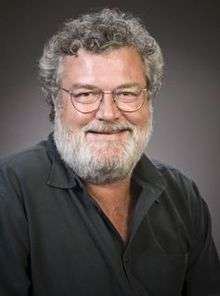James Belich (historian)
| James Belich | |
|---|---|
 James Belich in 2010 | |
| Born |
1956 Wellington, New Zealand |
| Residence | Oxford |
| Nationality | New Zealander |
| Alma mater | |
| Awards | |
| Scientific career | |
| Fields | History |
| Website | Staff profile at Oxford University |
James Christopher Belich, ONZM (born 1956), is a New Zealand historian, known for his work on the New Zealand Wars and on New Zealand history more generally. One of his major works on the 19th-century clash between Māori and Pākehā, the revisionist study The New Zealand Wars (1986), was also published in an American edition and adapted into a television series and DVD.[1][2]
Since 2013 Belich has been the Beit Professor of Imperial and Commonwealth History[3] and as the Director of the Oxford Centre for Global History at the University of Oxford.
Background
Of Croatian descent, he was born in Wellington in 1956, the son of Sir Jim Belich, who later became Mayor of Wellington. He attended Onslow College.
He gained an M.A. in history at Victoria University before being awarded a Rhodes Scholarship in 1978 and travelling to Oxford to complete his D.Phil at Nuffield College.
Academic career
He lectured at Victoria University of Wellington for several years before moving to the University of Auckland. In 2007 he was appointed Professor of History at the Stout Research Centre for New Zealand Studies at Victoria University.
The New Zealand Wars (1986) was based on his DPhil thesis, and won the international Trevor Reese Memorial Prize. It was later turned into a major documentary series for Television New Zealand. It was controversial for the startling claim that northern Maori invented trench warfare.
I Shall Not Die': Titokowaru's War (1990), based on his MA thesis, was also highly praised, winning the Adam Award for New Zealand literature.
Belich has written a two-volume work A History of the New Zealanders, consisting of Making Peoples (1996) and Paradise Reforged (2001).
Belich was made an Officer of New Zealand Order of Merit in the 2006 Queen's Birthday Honours List for service to historic research.
He expanded his area of research to colonial societies in general and the place of settler colonialism in world history with Replenishing the earth (2009).[4]
In 2011 Belich was appointed Beit Professor of Commonwealth History at Oxford University.[3][5]
Awards and honours
Works
- Titokowaru's War and Its Place in New Zealand's History. MA Thesis. Victoria University of Wellington, 1979.[7]
- New Zealand Wars 1845-1870: An Analysis of Their History and Interpretation. 1982. PhD Thesis. Nuffield College/Oxford University
- I Shall Not Die: Tītokowaru’s war, New Zealand, 1868-9. Bridget Williams Books, 1993. ISBN 0-04-614022-0
- Making Peoples: A History of the New Zealanders from Polynesian Settlement to the End of the Nineteenth Century. Penguin, 2007. ISBN 978-0-14-300704-3
- The New Zealand Wars and the Victorian Interpretation of Racial Conflict. Auckland University Press, 1986. ISBN 1-86940-002-X
- Paradise Reforged: A History of the New Zealanders from the 1880s to the Year 2000. University of Hawai’i Press, 2001. ISBN 0-8248-2542-X
- Replenishing the Earth: The Settler revolution and the rise of the Anglo-world, 1783-1939. Oxford University Press, 2009. ISBN 9780199297276
See also
References
- ↑ Belich, James (1998). The New Zealand Wars (1998 ed.). Auckland: Penguin. pp. 10, 11. ISBN 0-14-027504-5.
- ↑ "The New Zealand Wars". NZ On Screen. Retrieved 29 October 2016.
- 1 2 "Professor James Belich". Faculty of History website. Oxford University. Retrieved 31 October 2013.
- ↑ Belich, James (2009). Replenishing the Earth: The Settler Revolution and the Rise of the Anglo-world, 1783–1939. Oxford: Oxford University Press. p. 573. ISBN 978-0-19-929727-6. Retrieved 18 December 2009.
- ↑ "Historian James Belich heads to Oxford". stuff.co.nz. 9 May 2011. Retrieved 10 May 2011.
- ↑ "Previous winners". Creative New Zealand. Retrieved 24 October 2013.
- ↑ "Catalogue". victoria.lconz.ac.nz. 2011. Archived from the original on 20 July 2012. Retrieved 23 October 2011.
External links
| Wikimedia Commons has media related to James Belich. |